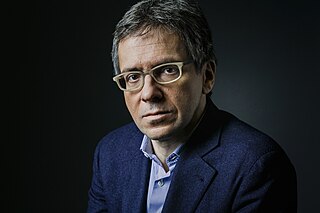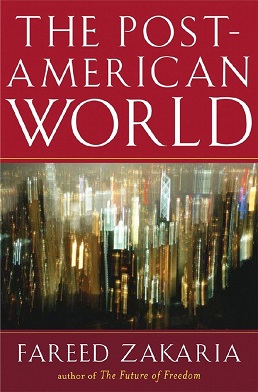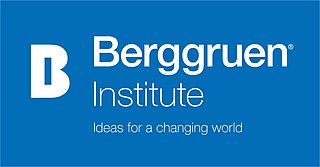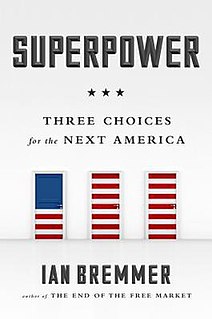State capitalism is an economic system in which the state undertakes business and commercial economic activity and where the means of production are nationalized as state-owned enterprises. The definition can also include the state dominance of corporatized government agencies or of public companies such as publicly listed corporations in which the state has controlling shares.

The Group of Eight (G8) was an inter-governmental political forum from 1997 until 2014. It had formed from incorporating the country of Russia into the Group of Seven, or G7, and returned to its previous name after Russia was removed in 2014.

Nouriel Roubini is a Turkish-born Iranian-American economist. He is Professor Emeritus (2021-present) and was Professor of Economics (1995-2021) at the Stern School of Business, New York University, and also chairman of Roubini Macro Associates LLC, an economic consultancy firm.
An emerging market is a market that has some characteristics of a developed market, but does not fully meet its standards. This includes markets that may become developed markets in the future or were in the past. The term "frontier market" is used for developing countries with smaller, riskier, or more illiquid capital markets than "emerging". As of 2006, the economies of China and India are considered to be the largest emerging markets. According to The Economist, many people find the term outdated, but no new term has gained traction. Emerging market hedge fund capital reached a record new level in the first quarter of 2011 of $121 billion. The 10 largest emerging and developing economies by either nominal or PPP-adjusted GDP are 4 of the 5 BRICS countries along with Indonesia, Iran, South Korea, Mexico, Saudi Arabia, Taiwan and Turkey.

The G20 or Group of Twenty is an intergovernmental forum comprising 19 countries and the European Union (EU). It works to address major issues related to the global economy, such as international financial stability, climate change mitigation, and sustainable development.

Eurasia Group is a political risk consultancy founded in 1998 by Ian Bremmer.

Ian Arthur Bremmer is an American political scientist and author with a focus on global political risk. He is the president and founder of Eurasia Group, a political risk research and consulting firm with principal offices in New York City. He is also a founder of the digital media firm GZERO Media.

Ha-Joon Chang is a South Korean institutional economist, specialising in development economics. Chang is the author of several widely discussed policy books, most notably Kicking Away the Ladder: Development Strategy in Historical Perspective (2002). In 2013, Prospect magazine ranked Chang as one of the top 20 World Thinkers.
Political risk is a type of risk faced by investors, corporations, and governments that political decisions, events, or conditions will significantly affect the profitability of a business actor or the expected value of a given economic action. Political risk can be understood and managed with reasoned foresight and investment.

The Post-American World is a non-fiction book by American journalist Fareed Zakaria. It was published in hardcover and audiobook formats in early May 2008 and became available in paperback in early May 2009; the Updated and Expanded Release 2.0 followed in 2011. In the book, Zakaria argues that, thanks to the actions of the United States in spreading liberal democracy across the world, other countries are now competing with the US in terms of economic, industrial, and cultural power. While the US continues to dominate in terms of political-military power, other countries such as China and India are becoming global players in many fields.
The Beijing Consensus or China Model, also known as the Chinese Economic Model, is the political and economic policies of the People's Republic of China (PRC) that began to be instituted by Deng Xiaoping after Mao Zedong's death in 1976. The policies are thought to have contributed to China's "economic miracle" and eightfold growth in gross national product over two decades. In 2004, the phrase "Beijing Consensus" was coined by Joshua Cooper Ramo to frame China's economic development model as an alternative—especially for developing countries—to the Washington Consensus of market-friendly policies promoted by the IMF, World Bank, and U.S. Treasury. In 2016, Ramo explained that the Beijing Consensus shows not that "every nation will follow China’s development model, but that it legitimizes the notion of particularity as opposed to the universality of a Washington model".

The China–Japan–South Korea trilateral summit is an annual summit meeting held between the People's Republic of China, Japan and South Korea, three major countries in East Asia and the World's 2nd, 3rd & 9th Largest Economies. The first summit was held during December 2008 in Fukuoka, Japan. The talks are focused on maintaining strong trilateral relations, the regional economy and disaster relief.
An international monetary system is a set of internationally agreed rules, conventions and supporting institutions that facilitate international trade, cross border investment and generally the reallocation of capital between states that have different currencies. It should provide means of payment acceptable to buyers and sellers of different nationalities, including deferred payment. To operate successfully, it needs to inspire confidence, to provide sufficient liquidity for fluctuating levels of trade, and to provide means by which global imbalances can be corrected. The system can grow organically as the collective result of numerous individual agreements between international economic factors spread over several decades. Alternatively, it can arise from a single architectural vision, as happened at Bretton Woods in 1944.
The East Asian model pioneered by Japan, is a plan for economic growth whereby the government invests in certain sectors of the economy in order to stimulate the growth of specific industries in the private sector. It generally refers to the model of development pursued in East Asian economies such as Japan, South Korea and Taiwan. It has also been used by some to describe the contemporary economic system in Mainland China after Deng Xiaoping's economic reforms during the late 1970s and the current economic system of Vietnam after its Doi Moi policy was implemented in 1986.

The Group of Two is a proposed informal special relationship between the People's Republic of China and the United States of America. Originally initiated in 2005 by C. Fred Bergsten as primarily an economic relationship, it began to gain wider currency and scope from foreign policy experts as a term recognizing the centrality of the Sino-American relations near the beginning of the Obama Administration. Prominent advocates include former National Security Advisor Zbigniew Brzezinski, historian Niall Ferguson, former World Bank President Robert Zoellick and former chief economist Justin Yifu Lin.
Globalization in China discusses the history of globalization in China; including the economic, social, cultural influences that have been integrated into Chinese society.

The End of the Free Market: Who Wins the War Between States and Corporations? is a 2010 non-fiction book by Ian Bremmer, that discusses the rise of state capitalism, a system in which governments dominate local economies through ownership of market-dominant companies and large pools of excess capital, using them for political gain. This trend, Bremmer argues, challenges America's economic strength and the conduct of free markets everywhere.

The Berggruen Institute is an independent think tank aimed at reshaping political and social institutions in the face of the great transformations of the 21st century. The Berggruen Institute seeks to work across cultures, disciplines and political boundaries and engage great thinkers to develop and promote long-term answers to the biggest challenges facing humanity today.

Superpower: Three Choices for America's Role in the World is a 2015 non-fiction book by Eurasia Group president Ian Bremmer that offers an analysis of the foreign policy of the United States since the end of the Cold War, and possible ways forward.
Authoritarian capitalism, or illiberal capitalism, is an economic system in which a capitalist market economy exists alongside an authoritarian government. Related to and overlapping with state capitalism, a system in which the state undertakes commercial activity, authoritarian capitalism combines private property and the functioning of market forces with repression of dissent, restrictions on freedom of speech and either a lack of elections or an electoral system with a single dominant political party.












